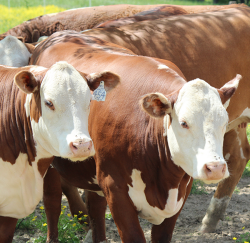Tick-Borne Diseases

Theileria orientalis & Asian Longhorned Ticks
Theileria orientalis is an emerging disease in the United States that predominantly affects cattle and is often associated with ticks. There are many types of Theileria that affect multiple species of animals and cause varying symptoms, however, the genotype Ikeda is associated with more severe disease in cattle.
Theileria is a parasite that affects red and white blood cells and is typically spread by the Asian Longhorned tick. There is also a risk of spreading disease through routine husbandry practices between infected animals.
Clinical signs associated with Theileria orientalis include anemia, pale gums, late term abortions, and fever. Theileria symptoms can appear similar to anaplasmosis in cattle. Pregnant heifers and calves are the most susceptible to disease. There is no approved treatment or effective vaccine and cattle that recover from initial illness become chronic carriers of disease. There are no known risks to human health from Theileria, but the Asian Longhorned tick can spread diseases that cause illness in humans.
July 7, 2022 - Disease Affecting Cattle Detected in Tennessee
August 10, 2020 - Livestock and Pet Owners Should Be Aware of Tick Season in Tennessee
Where is the Asian Longhorned Tick?
Cattle Producers
- Prevention of disease should be focused on tick control.
- Effective methods of tick control include: keep pastures mowed short, use veterinary approved tick prevention treatments, restrict movement of grazing cattle, regularly inspect cattle for ticks
- Cattle exhibiting signs such as pale gums or lethargy should be isolated from the rest of the herd and contact your veterinarian
- Consider testing animals for tickborne diseases before adding to your herd
Veterinarians
- Cattle presenting with clinical signs such as anemia, lethargy, fever, or abortions should be considered for Theileria testing, especially if other causes of disease have been ruled out
- If you suspect your cattle may have Theileria, please contact your herd veterinarian or Kord Animal Health Diagnostic Laboratory.
- PCR testing for Theileria orientalis is available at Kord Animal Health Diagnostic Laboratory.
Related Links
- Emerging Risk Notice: Theileria orientalis (usda.gov)
- Theileria orientalis Ikeda in Tennessee | Department of Animal Science
- Theileria orientalis Ikeda Genotype in Cattle, Virginia, USA - Volume 25, Number 9—September 2019 - Emerging Infectious Diseases journal - CDC
- What you need to know about Asian longhorned ticks - A new tick in the United States | Ticks | CDC